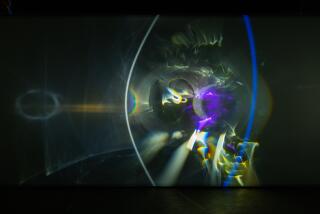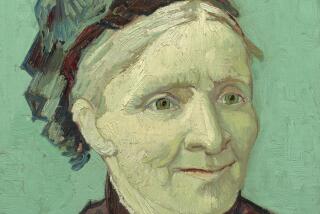Abraham Cruzvillegasâ buoyant assemblages toy with cars, sex and the culture of waste

Abraham Cruzvillegasâ sculptures at Regen Projects in Hollywood. (Genaro Molina / Los Angeles Times)
It started with a backseat. The sensation of being driven places as a child in a backseat, the furtive amorous histories begun in a backseat â and the memory of Abraham Cruzvillegasâ first schoolboy crush for a woman who sold tortillas in his Mexico City neighborhood â these were the inspirations behind a song the artist wrote roughly six years ago.
âIt was about a Ford Galaxy wagon from 1969,â he says. Adding, with a mischievous smile: âIt wasnât a coincidence that it was a â69.â
The backseat serves as an important point of departure in âAutoconcanciĂłn,â Cruzvillegasâs second solo exhibition at Regen Projects in Hollywood. The show features 10 new sculptures, each built around a backseat, from the same make and model of cars he and his family have owned over the course of his life. Thereâs a backseat from a Fiat 500, a Volkswagen Beetle and, of course, a Ford Galaxy.
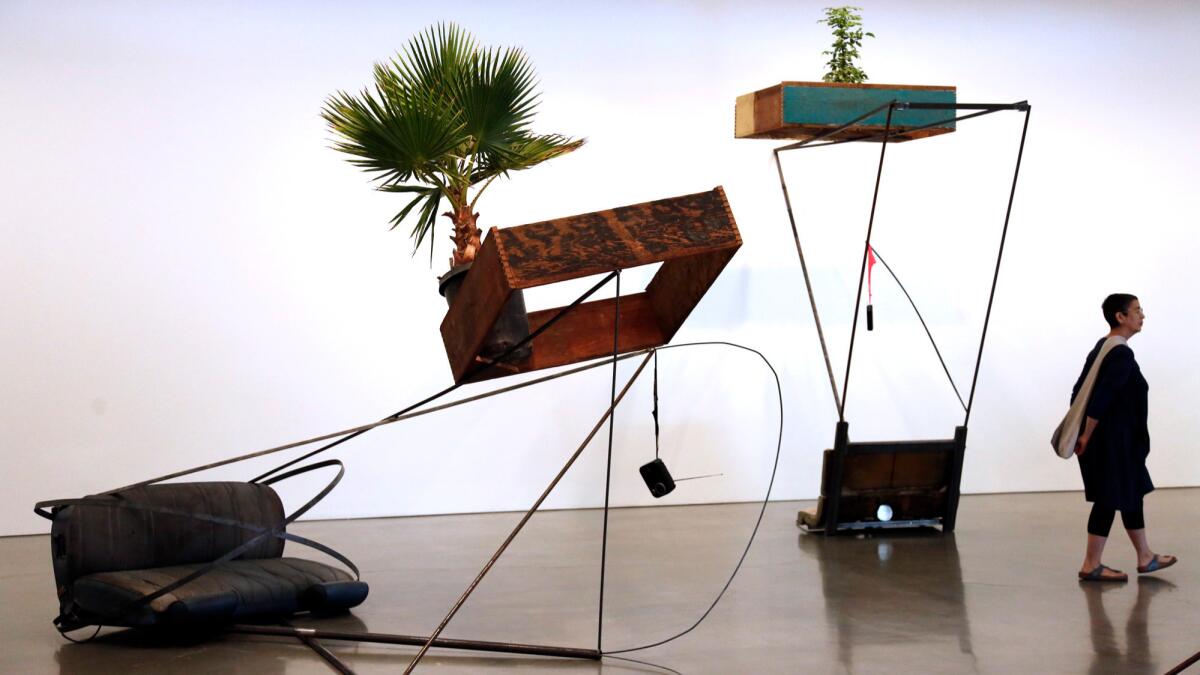
These serve as props upon which Cruzvillegas has built ramshackle structures of metal and wood, each bearing a California plant that can be eaten or used for medicinal purposes. Attached to many of the works â in some cases, with womenâs underwear â are transistor radios tuned to local stations broadcasting in English, Spanish and Korean, among other languages.
Stand in the gallery amid these pieces and you might get the sensation that mounds of detritus have sprung to life and are uprooting bits of nature in the process.
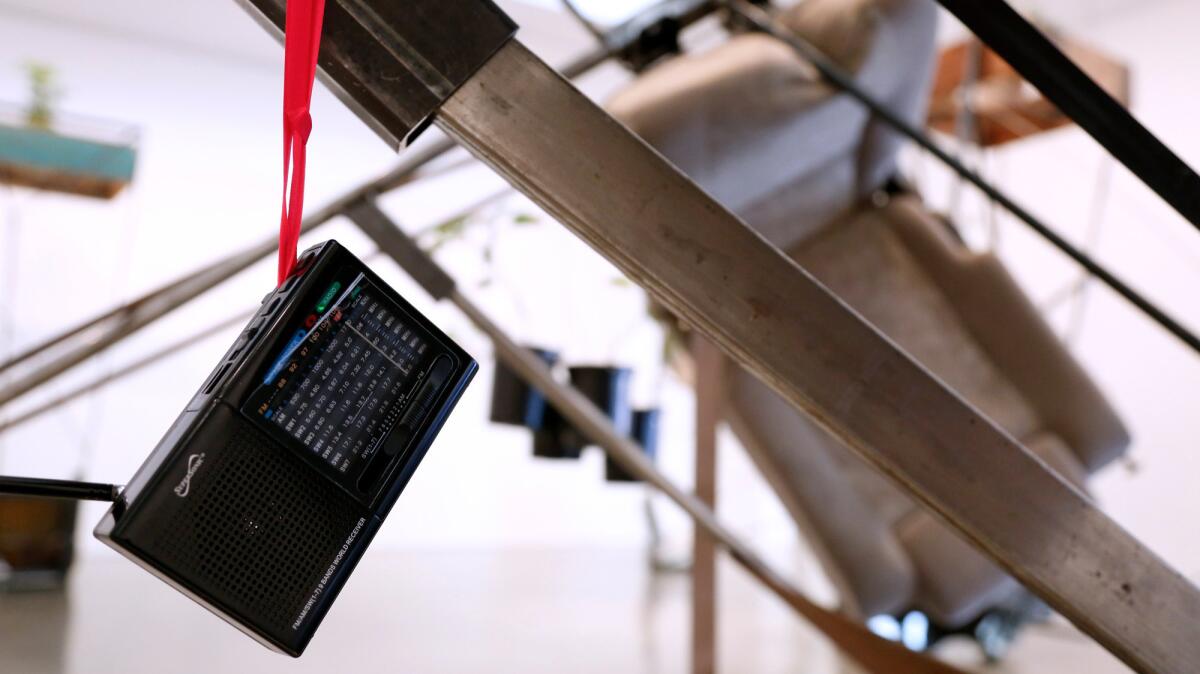
âItâs a synthesis of my identity and California identity,â explains Cruzvillegas, decked out in a suit and a newsboy cap as he wanders the gallery in the moments before his exhibition opened to the public. âItâs about how we look at things.â
For more than a dozen years, the Mexico City-based artist â who last year created a commission for the Turbine Hall at Londonâs Tate Modern â has produced sculpture that unites a global array of histories and themes, both personal and universal.
There is his preoccupation with informal architecture â or autoconstrucciĂłn, at it is known in Spanish â the D.I.Y. building that takes place in locations the world over, places where resources are scarce and construction is done bit-by-bit with whatever happens to be at hand.
Itâs a building method that harkens back to his childhood home, on the southern outskirts of Mexico City, which was built by his father and displays the architectural quirks of a space that has been crafted slowly, over time. (In 2014, he took the producers of the television program Art21 on a tour.)
âItâs pragmatic, itâs efficient â but not in a capitalistic way,â says Cruzvillegas, of autoconstrucciĂłn. âItâs also unstable, chaotic, contradictory, stupid, deliriant and inefficient.â
These are qualities embodied in his own work, autoconstrucciones of sorts that frequently seem to hover on the edge of destruction.
In âAutoconcanciĂłn VI,â one of the new sculptures on view at Regen, a pile of metal rods appear to erupt out of a car seat as a wooden frame balances gingerly on the edge of a triangle made of metal. In the frame sits a jojoba plant in a pot. The whole thing appears to be on the verge of collapsing.
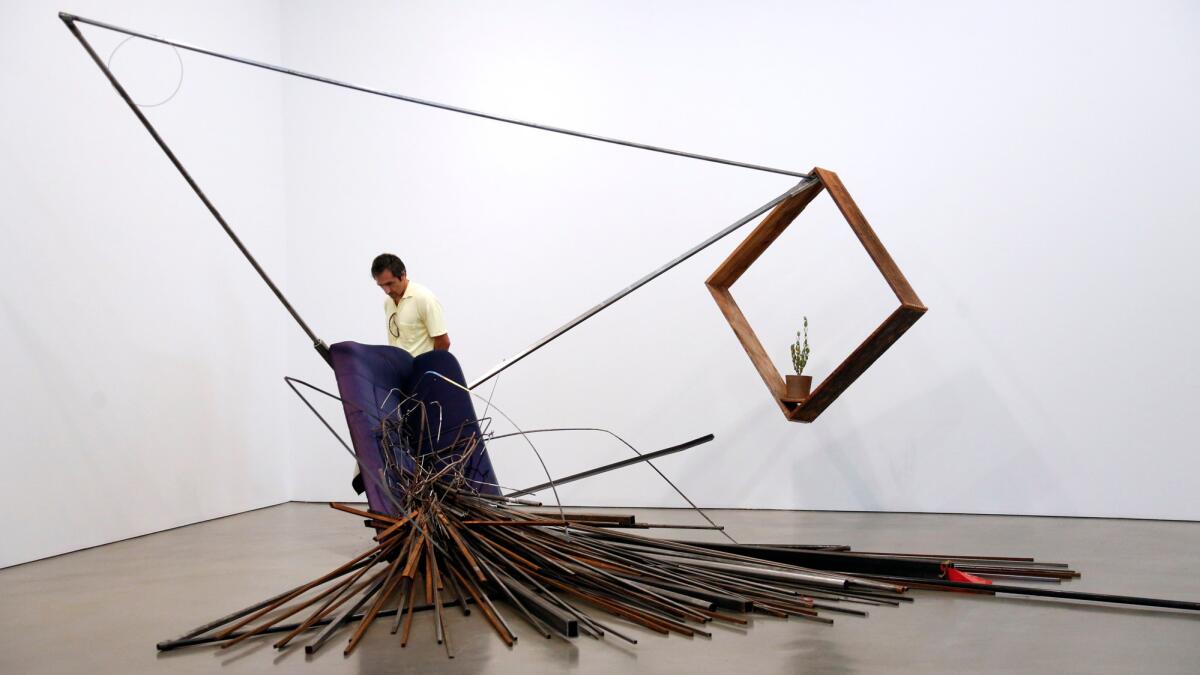
As in the artistâs other installations, the use of pre-existing materials is paramount. Cruzvillegas is interested in the notion of working with the discarded, of objects that are forsaken as trash, but which might still have use.
âAll of these things are about consumption,â he says. âAt one time, having a car, for example, meant having property. If it breaks, you take it to the garage. You fix it. You keep that car for a very long time. Nowadays you throw it away. Modernity is about consumption; modernity means throwing away.â
Throughout his career, Cruzvillegasâ pieces have employed found bits of stone, bottle caps, beer bottles, junk metal, feathers and wood. His installation at the Tate Modern consisted of 240 planters filled with dirt from empty lots around London. During the exhibition, these sprouted weeds and other hardy plants that had been carried in with the soil â evidence that the seemingly dead can be full of life.
For his show at Regen, the artist worked with piles of scrap metal and old car seats secured by his assistants. âI improvise with everything they give me,â he says. âI donât select. I donât choose. I donât discard.â
But as slapdash as his work may appear, Cruzvillegasâ pieces make serious nods to art history â to the bronzes of Catalan sculptor Julio Gonzalez, who combined forms both organic and abstract, to the entropic cage forms of British artist Anthony Caro, and to the arrangements of wires, covered in hair, by U.S. artist David Hammons.
âThese guys are super important to me as artists,â says Cruzvillegas. âI use that language.â
In his show at Regen Projects, the artist ties all of these concepts to the landscape of Southern California: Namely, car culture.
Here, his autoconstrucciones have become âautoconcancionesâ â a play on words that literally means âcars with songsâ â inspired by automotive backseats and all that they might signify. The attached transistor radios, dangling from scanty panties, fill the gallery with a low-volume murmur. The plants â which include a palm and a prickly pear cactus â evoke natureâs power of transformation and regeneration.
In a way, the pieces strip the invincible auto of its most macho qualities.
âItâs about love,â says Cruzvillegas as he surveys the gallery. âThis is where love happens.â
-------------
âAbraham Cruzvillegas: AutoconcanciĂłnâ
Where: Regen Projects, 6750 Santa Monica Blvd., Hollywood
When: Through Oct. 22
Info: regenprojects.com
Sign up for our weekly Essential Arts & Culture newsletter Âť
Find me on Twitter @cmonstah.
ALSO:
Hammer Museumâs âRadical Womenâ to showcase Latina artists on the politics of the female body
Review: The growing divide between wealth and poverty, as seen through one German artistâs eyes
âThe Vermeer of Los Angelesâ? Slow-art champion Tom Knechtel lets us in the studio
Meet the 2016 MacArthur fellows
More to Read
The biggest entertainment stories
Get our big stories about Hollywood, film, television, music, arts, culture and more right in your inbox as soon as they publish.
You may occasionally receive promotional content from the Los Angeles Times.

